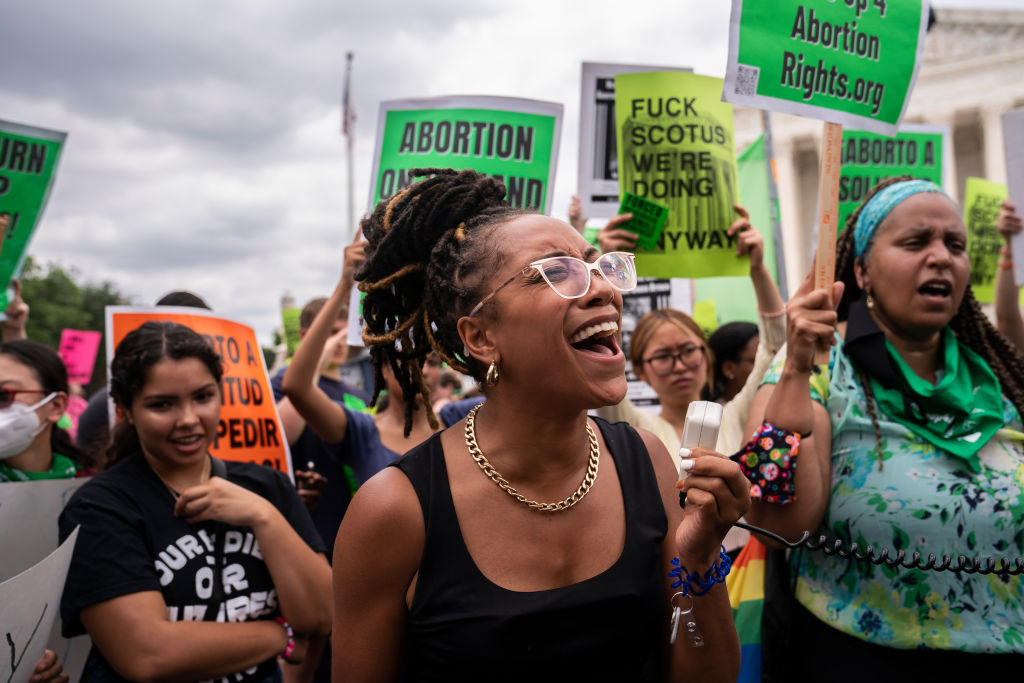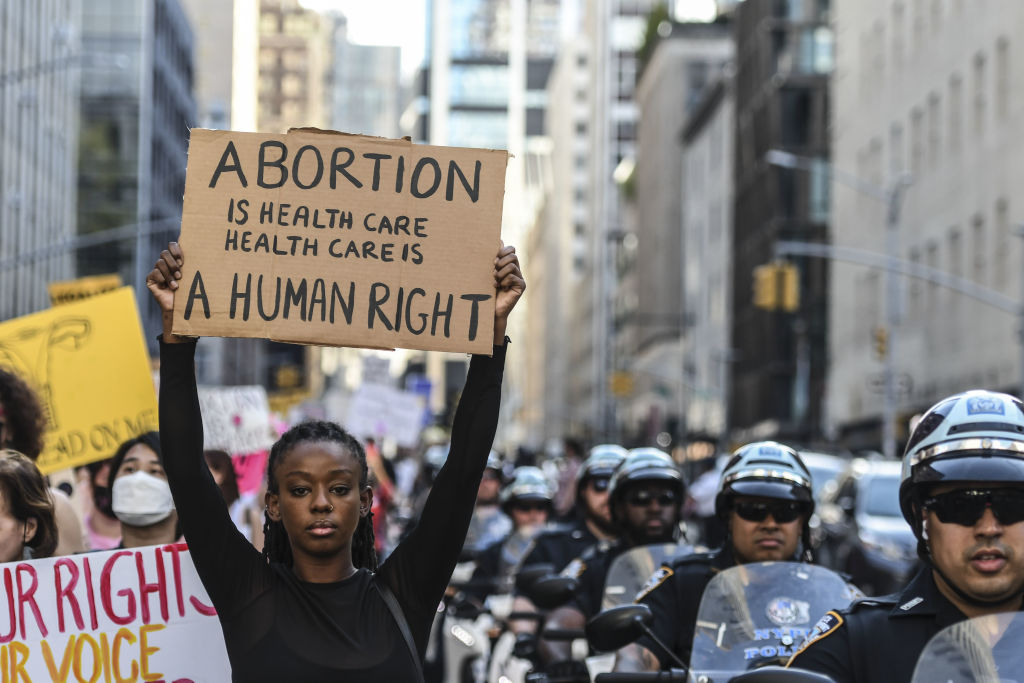
Source: Nathan Howard / Getty
Black women are worried about the future of abortion and reproductive rights as politicians fail to provide affordable access to birth control and fight to curtail access to Mifepristone, an abortion medication that can be used to terminate pregnancy through ten weeks gestation.
According to a new survey published by In Our Own Voice: National Black Women’s Reproductive Justice Agenda, half of Black women of reproductive age who participated in the survey expressed interest in obtaining birth control pills over the counter.
Of women aged 18 to 44, a significant portion were interested in accessing birth control pills over the counter. The study noted that a percentage of women aged 18 to 44 could not afford to pay $45 or more for a three-month supply of birth control pills, which can retail around $49.99.
Following the dismantling of Roe V. Wade in 2022, fourteen states enacted complete bans on abortion.
Except Florida, states with existing abortion bans have not safeguarded the right to use or access contraception, like birth control. Among the remaining states that either ban or significantly restrict abortion access, there is a lack of state-level protections for contraceptives. This absence of protections leaves certain contraceptive methods susceptible to potential future efforts aimed at restricting access.
Additionally, several other states prohibit the delivery of abortion-inducing drugs, such as Mifepristone, via mail, and mandate in-person doctor visits before obtaining a prescription for the pill. According to the Guttmacher Institute, a research organization advocating for abortion access, medication abortions accounted for 63% of all abortions in the United States in 2023.
Due to the bans, 41% of respondents said they considered their own risk of death should they get pregnant. Around 36% have thought about the consequences of being arrested due to pregnancy-related issues.
Those fears may compound now that anti-abortion activists are fighting to restrict access to Mifepristone, in a new Supreme Court Case that began on March 26. On Tuesday, the US Supreme Court heard arguments in the ongoing case.
The lawsuit, initiated by anti-abortion doctors and medical organizations, alleges that the FDA breached regulations in its oversight of mifepristone. Although Mifepristone has been FDA-approved for decades and is deemed safe and effective, anti-abortion advocates argue otherwise, claiming that the FDA failed to properly test and research the drug before its approval process, according to CNN.
If the Supreme Court sides with the anti-abortion group, it could cease the availability of Mifepristone for medication abortion via telehealth, impacting abortion access even in states where it remains legal.
Access to birth control and abortion medication like Mifepristone is critical, as Black women are three times more likely to die from pregnancy-related issues than their white counterparts, according to the National Partnership For Women & Families. Historically, Black women have faced disproportionately higher rates of pregnancy complications, including conditions like hypertension, preeclampsia, hemorrhaging, and maternal sepsis.
CEO of In Our Own Voice, Dr. Regina Davis Moss, weighs in on the issue.
In a statement to NewsOne, Dr. Regina Davis Moss, President & CEO of In Our Own Voice, said she noticed that there was an overwhelming population of Black voters who are ready to fight back against unfair abortion laws.
“Since the Supreme Court overturned Roe v. Wade and eliminated the federal right to abortion, Black voters have taken notice and are ready to hold anti-abortion politicians accountable. Our poll found that compared to 2020, Black voters are now 19 percentage points more likely to prioritize political candidates who support abortion access over those who oppose it. To win our votes, politicians should seek to expand our reproductive freedom and bodily autonomy – not take it away.”
An in-clinic abortion can cost anywhere between $800 to $2,000 depending on a woman’s trimester, according to Planned Parenthood. Dr. Moss noted that Mifepristone is often a cost-efficient way for women to receive abortion treatment.
“Medication abortion is often more affordable than an in-clinic procedure and fewer people have to travel or take time off work when pursuing this option,” the CEO of In Our Own Voice said.
“Those who are running for office or who currently hold office need to understand that economic justice is also tied to Reproductive Justice. You can’t have one without the other. We need leaders to commit to life-saving policies that will support all pathways to our ability to choose if, when and how we have families as well as our ability to raise families in safe and thriving environments. The collective power of our votes is stronger than the decisions of a few. We’re likely to continue to see Black voters demonstrating this strength.”
According to Dr. Moss, grave consequences could lie ahead if the Supreme Court decides to further restrict access to the abortion pill.
“For Black women, the decisions that politicians and courts make about abortion access are deeply felt on a personal level. About 40 percent of Black women of reproductive age have considered their risk of maternal mortality, while 34 percent in restrictive states have thought about their risk of being arrested due to abortion bans in place since the collapse of Roe. Black women, girls, and gender-expansive people have already been greatly impacted by state abortion bans: as access to abortion care shrinks in states with large Black communities, we are also seeing troubling rates of Black maternal mortality in the U.S. and shocking cases of Black women being targeted by law enforcement for miscarriages and other pregnancy outcomes. If the Supreme Court decides to disregard medical evidence and allow mifepristone to be pulled from the shelves, the most common form of abortion care will be pushed out of reach for those who need it most and the criminalization of pregnancy – especially among Black people – will become an even bigger problem.”
She added, “At In Our Own Voice we believe in the collective political power of Black women and Black communities – and we recognize that protections for abortion rights are just one piece of a broader agenda needed to ensure that we can make our own decisions about if, when and how to grow our families. Ahead of November’s elections. In Our Own Voice’s I Am A Reproductive Justice Voter campaign will be on the ground across the country meeting Black voters where they are and having conversations about the power they hold at the ballot box.”
SEE ALSO:
Black Maternal Health: Former NFL Cheerleader’s Death Spotlights Racial Equity In Sepsis Care
On 1-Year Anniversary Of Dobbs Decision, Black Girls And Women Remain Critically Vulnerable
The post Black Women Express Concerns About The Future Of Abortion And Reproductive Rights In New Poll appeared first on NewsOne.

